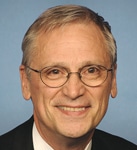U.S. Rep. Earl Blumenauer (D-Ore.) will introduce Dec. 4 legislation to fund U.S. transportation infrastructure in the nation now and into the future.
The two bills will establish a series of pilot projects to further study the application of a vehicle-miles-traveled fee and establish a 15-cents-per-gallon increase to the federal gas tax.
“Increased vehicle-fuel efficiency allows for increased demands on our transportation system without contributing as much to its maintenance. An analysis by the Congressional Budget Office based on current driving patterns demonstrates the newest fuel economy standards for automobiles will result in a 21 percent reduction in Highway Trust Fund revenue by 2040,” Blumenauer said.
“There are already significant funding challenges. Congress has transferred $55 billion in general fund revenues to the Highway Trust Fund to avoid bankruptcy since 2009. When the current authorization expires, the Highway Trust Fund will require almost $15 billion a year in addition to existing gas tax receipts, merely to maintain 2009 funding levels.
“Our failure to adequately fund transportation infrastructure imposes huge costs on American citizens and businesses. Last year, congestion cost urban Americans $87.2 billion a year in time wasted sitting in traffic, and higher transportation costs have pushed logistics costs to nearly 10 percent of our gross domestic product. A recent analysis by the American Society of Civil Engineers suggests that the cost of our declining transportation system could result in the loss of 876,000 jobs by 2020. Until we tie our transportation revenues to our transportation demands, this situation will worsen.”
The National Surface Transportation Policy and Revenue Study Commission noted that a vehicle-miles-traveled charge is the “the most promising alternative revenue measure” to our existing gas tax, while the National Surface Transportation Infrastructure Financing Commission reported that “a charge for each mile driven . . . has emerged as the consensus choice for the future.” Both commissions found that this system was efficient at raising revenue.
A number of states, including Oregon, Nevada, Minnesota, Iowa, Texas, and New York have tested pilot projects where they charged drivers for the number of miles they traveled rather than the fuel they consumed. The tests have proved convenient for drivers, demonstrated strong protections for personal privacy, and have been easily administrable.
A recent GAO report on this subject noted, “Should Congress wish to explore mileage fees as a mechanism for funding surface transportation, it should consider establishing a pilot program to evaluate the viability, costs, and benefits of mileage fee systems . . . .”
The Road User Fee Pilot Project establishes a competitive grant program to fund VMT pilot projects that will help answer outstanding questions about privacy, implementation, and equity. These projects will help answer Congress’s outstanding questions, and provide a variety of models from which best practices can be determined.
Blumenauer will hold a press conference Dec. 4 at 10:30 a.m. in room 201 of the Capitol Visitor Center (HVC-201) to announce the proposed legislation.
